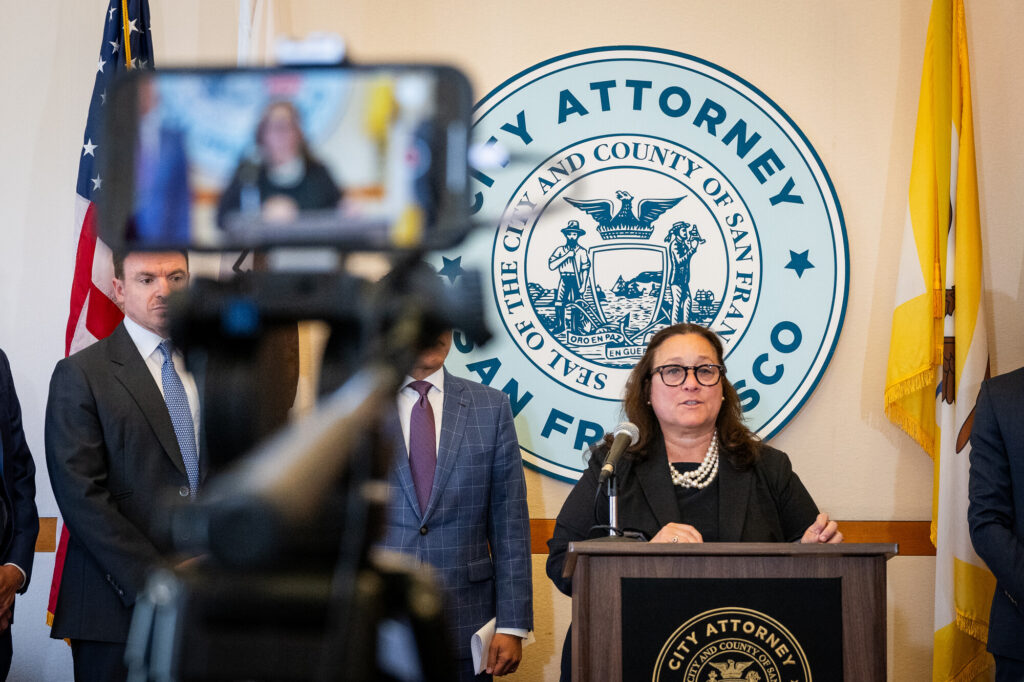In a significant legal move, San Francisco’s Chief Deputy City Attorney, Yvonne Meré, has filed a lawsuit against AI-powered deepfake pornography websites. These platforms have emerged as a troubling force, drawing over 200 million visitors and contributing to a harmful trend of using artificial intelligence to “undress” women and girls without their consent. The lawsuit not only seeks to hold these platforms accountable but also aims to establish new legal boundaries for the misuse of AI in harmful ways.
The Growing Threat of AI-Driven Deepfake Technology:
AI deepfake technology, once limited to high-tech labs and research, has now become widely accessible to the general public. This technology allows users to create hyper-realistic, manipulated images and videos by superimposing one person’s face onto another’s body. When this technology is used to undress women and girls, it creates a unique form of harassment and image-based sexual abuse, often without the victims’ knowledge or consent.
The rise of AI deepfakes has amplified concerns about the misuse of technology. The lawsuit highlights how these AI tools have been used to exploit innocent individuals by transforming their photos into explicit content without their consent. Many of these images are shared widely across the internet, leaving victims feeling exposed and powerless to control the spread of these damaging visuals.
Legal Grounds for the Lawsuit:
San Francisco’s lawsuit seeks to tackle both the ethical and legal implications of AI-powered deepfake pornography. The city is arguing that these websites violate state and federal laws designed to protect individuals from privacy invasion and non-consensual exploitation.
The lawsuit points to several key legal issues:
- Privacy Violation: Using someone’s image or likeness without their consent for such explicit purposes is a blatant invasion of privacy, and it undermines basic human dignity.
- Image-Based Sexual Abuse: The digital manipulation of real women’s faces into pornographic material can have severe emotional and psychological consequences, blurring the line between online and offline harassment.
- Profit from Exploitation: These AI deepfake websites profit from the objectification and exploitation of women, with many platforms offering paid services that allow users to create such deepfakes on demand.
Chief Deputy City Attorney Yvonne Meré has made it clear that the lawsuit aims to seek justice for victims and set a legal precedent that can protect future potential targets of this disturbing trend. In particular, the lawsuit highlights that platforms enabling these harmful practices must be held responsible for the harm they cause.

The Societal Impact: Why This Lawsuit Matters
The misuse of AI deepfake technology goes beyond mere digital manipulation— it represents a dangerous tool for weaponizing personal data against individuals. The victims of these non-consensual images, often unsuspecting women, face a wide range of consequences, including:
- Emotional Distress: Victims often experience extreme distress, knowing that their image has been manipulated and used in explicit content without their consent.
- Loss of Privacy: Once these deepfake images or videos are circulated online, it becomes nearly impossible for victims to regain control over their personal images, affecting their lives in both personal and professional contexts.
- Reputational Damage: Non-consensual pornography can have severe reputational consequences for victims, damaging personal relationships, careers, and mental health.
San Francisco’s lawsuit emphasizes that these deepfake pornography websites perpetuate a broader societal issue of misogyny and digital violence, which targets and dehumanizes women. This case marks one of the first substantial efforts to take legal action against AI-powered platforms that are profiting from such exploitation.
The Role of AI in Regulating Deepfakes:
While AI has tremendous potential for positive applications, its misuse in creating deepfakes demonstrates the darker side of technological advancements. To address these issues, several steps need to be taken:
- Stronger Regulations: Current laws are often outdated and not equipped to deal with emerging AI technology. Governments need to introduce modernized regulations to specifically address the challenges posed by deepfake technologies.
- Platform Accountability: The companies that host or facilitate the creation of non-consensual AI deepfakes must be held accountable. This includes stricter content moderation, better monitoring tools, and proactive measures to take down harmful content.
- Public Awareness: Educating the public about the dangers of deepfake technology is essential. Individuals need to understand how their personal images could be misused and what steps can be taken to protect themselves.
A Call for Legal Precedent:
San Francisco’s lawsuit has the potential to set a crucial legal precedent in the fight against AI-generated deepfakes. If successful, it could open the door for more lawsuits, providing victims of this exploitation with the legal tools necessary to fight back against those who seek to harm them using AI.
Moreover, this case could push for stricter regulations surrounding the use of AI, particularly in non-consensual pornography. As technology continues to evolve at a rapid pace, lawmakers and tech companies alike must keep pace to ensure that AI is used ethically and responsibly.
Conclusion:
San Francisco’s lawsuit against AI deepfake pornography websites is a pivotal moment in the battle against the misuse of technology. As AI continues to shape the future of the digital world, this case brings to light the urgent need for legal frameworks that protect individuals from being exploited online. With the rise of deepfake technology, it’s not just the victims who are at risk; society as a whole must grapple with the ethical implications of AI in the wrong hands.
This lawsuit serves as a call to action for policymakers, tech platforms, and society at large to recognize the gravity of AI-driven exploitation and take decisive steps to prevent further harm.

My name is Augustus, and I am dedicated to providing clear, ethical, and current information about AI-generated imagery. At Undress AI Life, my mission is to educate and inform on privacy and digital rights, helping users navigate the complexities of digital imagery responsibly and safely.
